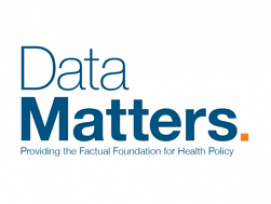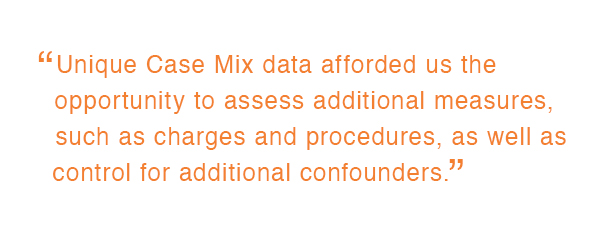Data Matters - November 2022 Edition Email

DATE: November 30, 2022

Opening Message:
Ten years ago this November, the Center for Health Information and Analysis was created as part of a statewide effort to control the growth of health care costs, improve health care access and quality, and promote public health.
CHIA has accomplished much in the past ten years, including first-in-the-nation total health care expenditure measurement and reporting on the overall performance of the Massachusetts health care system through its Annual Report; expanding financial reporting on the hospitals and health care systems in the Commonwealth; analyzing health care access, equity, and affordability; and the measuring of primary care and behavioral health spending; and distributing surveys to employers and residents of the Commonwealth to measure health insurance coverage, access, and use of health care services; in addition to numerous other important functions. CHIA’s mission continues to be to objectively report reliable and timely information about the Massachusetts health care system to create a factual foundation for providers, payers, policymakers, residents, and other stakeholders. To read more about CHIA’s work since its inception, please visit our website.
In today’s newsletter, we are also featuring a new research brief exploring the role of race/ethnicity in emergency department utilization in the “News You Can Use” section below. As always, the “Publications and Data Releases” and “Upcoming Events” sections of DataMatters will keep you up to date on reports CHIA has released recently and events of interest to the local health data community.
We also want to know your thoughts about this newsletter – things you like, things you wish we’d include, suggestions for future user profiles. Please email us at newsletter@chiamass.gov.
News You Can Use
|
CHIA has published a new research brief examining the association between race/ethnicity and the potential reliance on the emergency department (ED) for health care. The brief, Black and Hispanic Residents Report Higher Likelihood of Potential Reliance on the Emergency Department for Health Care than White Residents in the Commonwealth, utilizes data from three consecutive Massachusetts Health Insurance Surveys (2015, 2017, and 2019). Frequent utilization of the ED for non-emergent conditions can strain health care systems, impacting both hospitals and patients. While Massachusetts has made significant progress to minimize barriers to accessing and affording care, disparities persist among certain sub-populations. |
 |
- Compared to White residents, Black and Hispanic residents were 60% to 110% more likely to demonstrate a potential reliance on the ED, respectively, after accounting for individual-level demographic characteristics, health status and activity limitations, health insurance coverage, and health care access experiences, as well as family-level socioeconomic status.
- Residents who are children, female, or have family income below 139% of the federal poverty level (FPL) or family educational attainment of less than a high school diploma were more likely to have a potential reliance on the ED.
- Residents in fair or poor health and/or with an activity limitation, residents using Medicare or other public insurance, as well as residents reporting that they were unable to get an appointment as soon as needed all had greater likelihoods of potential reliance on the ED.
This research brief is part of a collection of reports and briefs focused on health care equity in the Commonwealth. Understanding the factors associated with potential reliance on the ED may help inform policies aimed at enhancing access to non-emergency health services and mitigate unmet health care needs.
For more information on the Massachusetts Health Insurance Survey (MHIS), please visit https://www.chiamass.gov/massachusetts-health-insurance-survey/
Data User Profile
Every edition of the DataMatters newsletter includes an interview with a user of CHIA data, exploring their experience obtaining our data and how it was used. We are grateful this month for the participation of Vicki Nielsen, MPH, Senior Clinical Epidemiologist, from the Massachusetts Department of Public Health (DPH). Ms. Nielsen and her co-authors—including lead-author Zhiyu Yan, Glory Song, Anita Christie, Lee H. Schwamm, and Kori S. Zachrison—used CHIA’s Hospital Inpatient Discharge Database (HIDD) Case Mix data to publish their March 2022 article, Integration of Regional Hospitalizations, Registry and Vital Statistics Data for Development of a Single Statewide Ischemic Stroke Database.
As you will read below, the purpose of this study was to explore the feasibility of integrating three different databases, including the Case Mix data, into a single statewide ischemic stroke database. The success of this attempt will enable future endeavors by Massachusetts DPH to monitor stroke outcomes
What was your research question? Why did you choose that question?
Stroke outcomes after hospitalization are essential to monitor for states aiming to improve quality of stroke care. Although there is a dearth of peer-reviewed literature assessing stroke survivor outcomes, states implementing quality improvement efforts should nevertheless continuously monitor stroke outcomes as well as inequities and disparities. The Massachusetts Department of Public Health is the recipient of federal funds from the Centers for Disease Control and Prevention under the Paul Coverdell National Acute Stroke Program (PCNASP). Although we leverage a wealth of data to conduct surveillance and evaluate this program, assessing how our quality improvement efforts impact outcomes after hospitalization is notably challenging.
Which CHIA data did you use?
We linked three datasets – Coverdell stroke registry data (maintained by IQVIA), Massachusetts death data, and CHIA Case Mix data. The Coverdell IQVIA stroke registry includes stroke cases presenting to Massachusetts Primary Stroke Service (PSS) hospitals participating in PCNASP (approximately 70% of PSS hospitals in the state participate in PCNASP). This linkage permitted us to broaden our ability to evaluate stroke outcomes under the PCNASP program. Further, not only did this linkage permit our assessment of mortality after hospitalization, but the unique Case Mix data afforded us the opportunity to assess additional measures, such as charges and procedures, as well as control for additional confounders.
What was your experience using CHIA data?
Linkage of Case Mix data to the Coverdell IQVIA registry (Phase 1) was facilitated by close concordance between the populations captured in the two datasets. This is important, as although Case Mix data provides several identifiers on which to link, the Coverdell IQVIA data is a limited dataset and does not include many direct identifiers. Linkage of data in Phase 2 (i.e., Case Mix and death data) was greatly facilitated by identifiers in both datasets.
Please briefly describe your research and key findings
As previously discussed, this project focused on the linkage of three datasets to a) broaden the data available to us during stroke hospitalization and b) assess outcomes among stroke survivors after hospitalization. We explored multiple different algorithms and validation of the final linkage demonstrated good linkage performance.
Which findings were particularly interesting, or surprising for you?
Approximately 20% of Case Mix data (reduced to PCNASP-participating hospitals) did not link to the Coverdell IQVIA registry data. This may indicate a misclassification of cases in one or both databases. However, it is important to note that review of patient demographics and clinical variables between the matched and unmatched records for the final integrated database did not indicate any systemic differences between records. Further, many biases introduced here can be accounted for statistically.
What "takeaway" information would you like to highlight from your research and/or your experience using our data?
Case Mix data can successfully be linked with other datasets and provides a wealth of additional data to pre-existing registries without additional data collection burden on hospitals. These data have been used to evaluate important outcomes for the PCNASP, including inequities and disparities, so that our program implementation in Massachusetts can be data-driven.
Publications and Data Releases
NEW!
Research Brief on Emergency Department Reliance by Race/Ethnicity
November 2022
As noted in the “News You Can Use” section above, CHIA has published a new research brief on emergency department use, Black and Hispanic Residents Report Higher Likelihood of Potential Reliance on the Emergency Department for Health Care than White Residents in the Commonwealth.
Using data from three consecutive Massachusetts Health Insurance Surveys (2015, 2017, and 2019), this research brief examines race/ethnicity and the potential reliance on the ED. .
Mandated Benefit Reviews
November 2022
Earlier this month, CHIA released its reviews of two bills, H1106/S717 An Act relative to human donor milk coverage and H4748/S2856 An Act relative to breast cancer equity and early detection. They are also now posted to CHIA’s website. CHIA evaluates the impact of mandated benefit bills referred by the Legislature for review. The reports are comprised of a medical efficacy analysis and an estimate of the effect that the proposed mandated benefit would have on the cost of health insurance.
H1106/S717, if passed, would require carriers that provide medical expense coverage for screening mammograms to cover diagnostic examinations for breast cancer and digital breast tomosynthesis (DBT) screening coverage that is equivalent to coverage provided for screening mammograms (i.e., with no cost sharing). H4748/S2856, would require health insurers to cover pasteurized donated human breast milk (DHM), including human milk fortifiers, for infants that meet certain criteria.
Behavioral Health and Readmissions in Massachusetts Acute Care Hospitals in SFY 2020
October 2022
Last month CHIA published its most recent report on Behavioral Health and Readmissions in Massachusetts Acute Care Hospitals in SFY 2020. Increasingly, efforts to reduce hospital readmissions have focused on developing strategies to better manage patients’ medical or surgical conditions. Evidence suggests, however, that patients with comorbid behavioral health conditions have higher readmission rates, have higher overall hospital utilization, and incur higher health costs.
This report finds important differences in the prevalence of behavioral health comorbidity by payer type, age, region, and any COVID-19 diagnosis, and differences in readmission rates for patients with and without comorbid behavioral health conditions.
Upcoming Events and Resources
Events and announcements of interest to our community, organized by CHIA, our data partners, and others
STAT News
STAT in NYC: A Look Ahead at Biotech in 2023
Monday, December 5, 2022, 6:00 - 9:00 PM
Come hear a discussion about the big regulatory and financial issues facing the pharmaceutical industry -- as well as for a panel featuring STAT reporters. Virtual registrants will receive a recording of the program after the event.
CHIA Oversight Council
Tuesday, December 6, 2022, 2:00 PM
CHIA’s appointed Oversight Council meets quarterly to discuss agency priorities and agenda-setting. The next meeting is scheduled for Tuesday, December 6, at 2:00 p.m. and will stream live on CHIA’s YouTube channel.
Massachusetts Health Data Consortium
Spotlight Analytics: Health Equity by Design in Spotlight
Wednesday, December 27, 2022
The Massachusetts Health Data Consortium (MHDC) has partnered with the Lown Institute to provide access to their renowned Hospital Index data via the MHDC Spotlight Data Analytics platform. This examines contemporary issues such as inclusivity, compensation, value, outcomes and patient safety, among others (hierarchical representation of the data and measures are below). To register for this free webinar on the Spotlight Data Analytics platform, click here.
Department of Public Health Public Health Council Meeting
Wednesday, December 14,, 2022
The Public Health Council of the Department of Public Health promulgates regulations, advises the Department on certain major policy decisions and actions and is responsible for voting Determination of Need applications submitted by health facilities. It meets once per month at DPH’s Boston office.
Massachusetts Health Policy Commission
Wednesday, December 14, 2022, 12:00 PM
The HPC’s 11-member Board meets approximately every six weeks throughout the year to review staff- (or guest)- presented overviews of the agency’s major workstreams, and other topics related to health care cost containment and reform. Major reports, statutory regulations, and publications are authorized by a majority vote at these meetings.
CHIA Data User Workgroups
Tuesday, January 24, 2022, 3:00 PM
These ongoing meetings are designed for data users and other interested parties to connect with CHIA to discuss analytical techniques and best practices in research using CHIA's MA APCD and Case Mix databases.
The next virtual workgroup meeting will be on Tuesday, January 24, 2023 at 3:00 p.m. For more information including past presentations and user support materials, visit the information page. To learn more about CHIA data, please visit https://www.chiamass.gov/chia-data/.
Join Our Team
A selection of open positions at CHIA. Please feel free to share broadly with your network. Follow CHIA on LinkedIn for more regular updates.
Associate Manager, Health Informatics and Reporting
Health Informatics and Reporting Team
CENTER FOR HEALTH INFORMATION AND ANALYSIS
www.chiamass.gov
